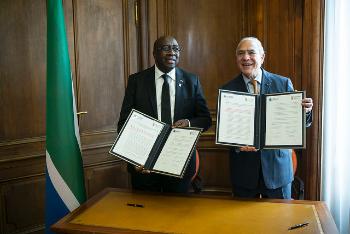South Africa
South Africa and the OECD
|
New! June 2018 - Work has started to develop a joint work programme with South Africa, aimed at promoting stronger and more inclusive growth. The proposed programme will initially focus on developing small, micro and medium enterprises, promoting trade and investment and improving the skills of the South African workforce.
In 2007 the OECD Council at Ministerial level adopted a resolution which led to South Africa’s becoming one of five Key Partners to the OECD, along with Brazil, China, India and Indonesia. Key partners contribute to the OECD's work in a sustained and comprehensive manner. A central element of the collaboration is the promotion of direct and active participation of these countries in the work of substantive bodies of the Organisation. South Africa's participation spans a wide array of policy issues, including macroeconomic policy and structural reform, debt management, fiscal policy, domestic resource mobilisation, competition policy, agricultural policy, public governance, rural and urban development, the fight against bribery, development, science, technology and innovation, chemicals testing and tourism. |
|
||
A mutually beneficial relationship
South Africa is Africa’s largest economy and usually is the “prime mover” for OECD activities supporting the objectives of NEPAD, especially in Southern Africa, on taxation, investment, competition policy and governance. As the OECD and South Africa deepen their collaboration, South African policy makers gain access to OECD expertise and good policy practices; the OECD, in turn, benefits from exposure to South African policy perspectives, to enhance mutual learning.
How is the co-operation co-ordinated?
The OECD’s Global Relations Secretariat develops and oversees the strategic orientation of this relationship and ensures that the dialogue remains focused, forward-looking and mutually beneficial. Usually, meetings are held between South African officials and experts from OECD countries and the OECD Secretariat, on topics mutually agreed on and jointly prepared with analytical studies.
South Africa's participation in OECD activities
South Africa is an Associate in 6 OECD Bodies and Projects, and a Participant in 15. It has also adhered to 19 OECD instruments, including most recently the Recommendation of the Council for Development Co-operation Actors on Managing the Risk of Corruption (2016). It participates in various OECD flagship projects and publications, e.g. the Economic Outlook, Education at a Glance, Going for Growth, Green Growth, the Employment Outlook, the OECD-FAO Agricultural Outlook, Pensions at a Glance, and the Science, Technology and Industry Outlook. South Africa is also integrated in almost half of all OECD datasets and participates in key horizontal projects, such as the OECD Strategy on Development.
South Africa has championed several of the OECD’s regional initiatives with sub-Saharan Africa. For example, as vice co-chair, it has actively contributed to the work of the OECD Sustainable Investment Programme for Africa . South Africa also participates in the activities of the SADC Regional Investment Policy Framework project, in the OECD African Development Bank (AfDB) Initiative to Support Business Integrity and Anti-Bribery Efforts in Africa, in the annual International Economic Forum on Africa and the African Economic Outlook. It is also an Associate in the Base Erosion and Profit Shifting (BEPS) project and a key and active member of the Inclusive Framework for BEPS Implementation Steering Group, feeding its own perspectives into the BEPS process as well as supporting the efforts of developing countries to provide input through the African Tax Administration Forum (ATAF) Technical Committee.
OECD Week in South Africa - July 2017This edition of OECD Week in South Africa saw the OECD partnering with the South African authorities and a range of other partners on a series of events covering economic growth, climate change, investment and more. It kicked off with the launch of the 2017 Economic Survey of South Africa on 24 July by OECD Secretary-General Angel Gurría and South African Finance Minister Malusi Gigaba. Mr Gurría delivered a keynote address at the South African Institute of International Affairs (SAIIA) and presented recent OECD work for the G20 on Climate Change at an event hosted by the Institute for Global Dialogue. The Secretary-General also held bilateral meetings with senior South African government officials, business and labour leaders and representatives of civil society. This week also included a series of high-level events including institutional meetings and opening remarks by Mr Gurría at an academic seminar on the G20 ‘Investing in Climate, Investing in Growth' report organised with the Energy Research Centre of the University of Cape Town with business, civil society, and academia representatives. |
Related Documents
